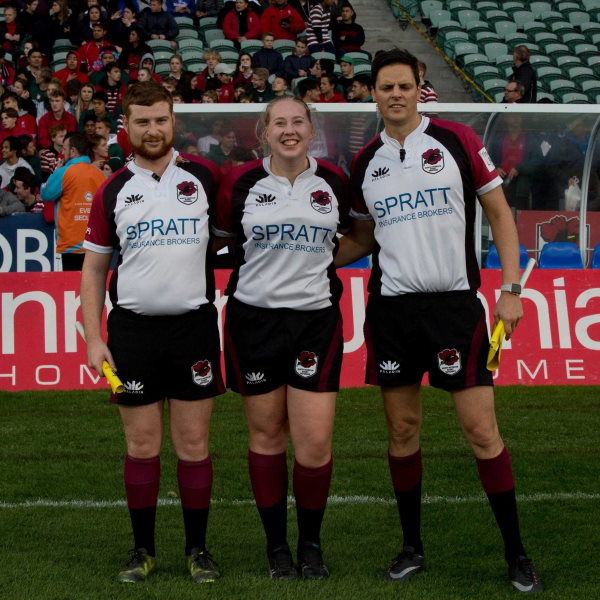
All
Becoming a Referee
Of all the roles we can be at a rugby club being the ref is often the least favourite but you will probably find it is the easiest and definitely rewarding.
- Categorygetting-started
- Last UpdatedSep 2021
The biggest barrier is most likely the fear of doing a bad job. We don't want to have people jeering and complaining at us. The truth is, unlike a club administrator, coach or manager who work more in the background, the referee is front and centre and on display and not everyone likes that.
I have never meet a ref who didn't care about the job they did.
Why be a Ref?
It is the easiest job of all when compared to becoming a coach, manager or administrator.
You get the best view of the game and it is fantastic being out there with the kids and being part of the game.
Something to think about.
The players need to be coached and trained to play the game. How many referees practice outside of a game? Every week our coaches are there guiding and training our kids to play. They don't start the season by turning up to the first game and go from there. Yet, that is often what a lot of referee's will do.
If you are a beginning referee you should practice as well. Don't let the first game be your first go. Organise with your team to referee short games at practice. Ref the ruck and tackling drills. If you do this you will find that you get quite good, quite fast. Come your first game you will be ready and confident. Afterwards, there'll definitely be areas to improve on but you will be looking forward to improving on them for the next game.
Another bonus of doing this practice is that your players will also become better. They will learn faster about how to play within the rules which will lead to playing smarter.
If you are an experienced referee, you should still do pre-season training with your team. There are always new rules as you move up the grades and the more your kids learn what to expect from you as a ref the easier it will be to ref their games and the better they will play.
How to get started
First, go through the resources we have put together below. These are targeted for every ref at all levels of the junior game. After that, look at the rules and advice we have for the grade you plan to ref.
Next, work with your team and coach to organise some practice scenarios for you to ref at training.
Finally, get out and ref that first game.
The role of the referee at junior level is to ensure the safety of the players and manage the players on the field in a way that they understand the laws of the game.
Glenn Newman
Pre-match
Have your own whistle. I always keep a spare in my car just in case my main whistle gets left behind somewhere.
Have a shirt that does not match your teams and clearly marks you out as the ref. The club may be able to provide you with some ref shirts. If you are interested contact the junior committee to get one.
Well before the match starts introduce yourself to the opposition and have a talk about the game ahead. Let them know anything you plan to focus on. Confirm laws and rulings. Confirm protocols about any head knocks that may occur. Ask them if they have any thoughts or want to raise anything. It's all about creating a relationship and establishing that you, as a volunteer, are there to do your best.
In-Game
When it's time, blow your whistle. The whistle signals for the game to stop and the players to pay attention to you. So blow it strongly. Especially when a try is scored, raise your hand, blow the whistle and be part of the celebration of the try.
Use your hand signals. These are really important to help the crowd watching know what is going on. The best example is playing advantage. When a knock on happens, hold your arm out to indicate that you have seen it and you are playing advantage. The crowd will see it and for that 'one guy' the rest of the crowd will soon tell him to chill out, "the ref has seen it".
Don't rush. Give yourself a few seconds to be clear on what you are blowing the whistle for.
Any serious injury, blow the whistle and stop the game. It doesn't matter that one team was on a roll and looking to score. We are a non-competition junior kids rugby and the player's safety takes precedence.
Read up on the concussion laws and guidance. Your role is to ensure the safety of the kids on the field. If you suspect a head knock. Stop the game, take a few minutes and ensure the player takes time off the field and is being attended by someone in their team. If you are concerned that the player should not continue say so to the team coach and that they should stay off for the rest of the game. The teams can not override you. This is a good topic to be clear on in the pre-match talk.
If you encounter a troublesome coach/parent who thinks the player should play on. Remind them that it is a non-competition kids game and that they are encourged to contact their club captain and the harbour union to report you on your actions.
Take time to explain your calls to the players. This will first help you become a better ref as well as help players understand what went wrong. Take time to also warn players of actions that may get them into trouble soon. As an example, at the next stoppage go over and tell the offender that their last tackle was creeping high and to ensure they keep them down. Or that they need to watch their actions in the ruck. If you can help the players avoid having the whistle blown this will improve them and the game.
Use your voice. 'Hands off the ball'. 'Black team has won it'. 'Advantage gold'. 'Play on'. All these types of cues will help the game flow and avoid you needing to blow the whistle.
Your role is to help educate the players on the laws but make sure you are not coaching them how to play.
Half Time
Make sure you make yourself available for the opposition coach to come and talk to you. If there are repeated penalties happening from them, go over and tell them about it and help them avoid them. Of course do the same with your own team.
If you know that there is problems with a player or teams actions then let the teams know that you know you're aware of it and you are looking to address it if you see it. By taking the initiative you can take the heat out of potentially bubbling discontent.
Full Time
Be part of the handshaking and acknowledge good players on both teams.
If you made mistakes let the teams know that you know that you got it wrong or need to improve in an area. We are all volunteers and we are all, (players, coaches and refs) learning a new craft.
Score Blowouts
In accordance with the Small Blacks Development Model guidelines, in the event that scores become one-sided (defined by a halftime score differential of 35+ points), both coaches must meet at halftime and come to an agreement as to how the issue can be addressed to create a more even contest. (E.g., change dominant player positions, change dominant team tactics, rotate players, swap players between teams)
In Rip Rugby, you can look to allow a team six rips instead of 4. Reduce a team to six players or increase a team to eight.
Reporting Serious Injury
It is up to the player's team to report any serious injuries of their players. There is no requirement for the referee to report these. That being said, it is good practice to confirm that the team will do so and report it, (via an email or phone call) to the club captain that a serious injury happened in your game.
A serious injury is anything that requires a visit to a medical professional.
You can read information from the NZRU about serious injuries and teams can find out details about what they should do on our Help - Serious Injuries Reporting article.
You should also look into some of our other articles around injuries.
Resources
An introduction to rugby refereeing can be found on the rugby toolbox website.
You can find some quick two minute videos about refereeing online at The Referee Series. Nice and short and to the point.
You can also find some good short direct help on the rugby toolbox website.
Don't try to learn and master everything all at once. Pick a topic and concentrate on that. For the next game pick another topic.
We also have the North Harbour rules combined with advice from our own referee's. Go to the grade you are refereeing to get some guidance.
| Tackle Grades | Rip Rugby Grades |
|---|---|

